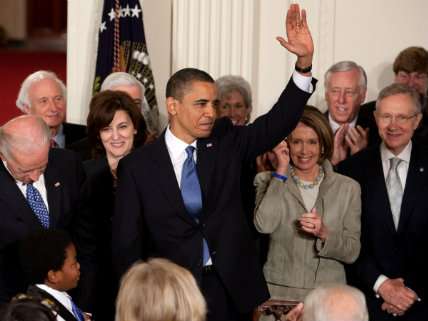Congressional Republicans Take Obamacare Repeal on a Test Run
It's not full repeal. And it won't pass. But it's still worth doing.

Sometime this week, the House is expected to vote on a bill that has been widely described as an Obamacare repeal bill. The bill doesn't repeal the entire law, but it would kill major provisions, including the insurance exchanges, coverage subsidies, and individual mandate to purchase insurance. While some parts of the law would remain on the books, it would be the end of Obamacare as we know it.
The House has passed dozens of bills repealing all or part of Obamacare over the last few years. What's different about this one, though, is that, last month, the Senate also passed a repeal bill—the first time it has done so. Indeed, the reason the bill targets only major provisions rather than the entire health law is that the Senate relied on a procedure known as reconciliation to pass the bill with a simple majority; reconciliation can only be used occasionally, and can only be used to pass provisions with budgetary impact, a vague standard which tends to mean that it needs to reduce the deficit.
The current bill meets that test: According to an estimate released by the Congressional Budget Office this week, passage would result in a net deficit reduction about $516 billion over the next decade. (A previous estimate has found a smaller reduction; the latest figure accounts for $42 billion in additional deficit savings from the recently enacted two-year delay of the health law's Cadillac tax.)
The bill passed by the Senate originated in the House, but was modified before passage; that's why the House is returning to the bill and passing it again, in its Senate-modified form. Once that happens, the bill will be sent to President Obama's desk, the first time any Obamacare-repeal bill has made it to the Oval Office. That alone makes it something of a milestone.
Practically, however, the bill won't have any direct impact on policy, because Obama is certain to veto it. Like so many previous GOP-led Obamacare bills, it is mostly a symbolic measure.
In one sense, then, the bill does not matter very much. One can even plausibly argue that it represents an abdication of responsibility. Congressional Republicans are touting as the bill as the "best shot at repealing Obamacare." It obviously has no chance at all. Furthermore, the bill, which as a result of the reconciliation process can only focus on certain budgetary provisions, would leave in place much of the law's regulatory apparatus. And it would do all of this without putting an alternative, replacement plan into effect, which is hardly surprising given that there is no clear GOP alternative waiting in the wings. (House Speaker Paul Ryan says it will pave the way for the eventual unveiling of a replacement.) This big Republican victory over Obamacare, then, will end with a presidential veto, and it doesn't address many of the health policy issues that would remain in what would essentially be a post-Obamacare world.
But in another sense, it's a small but important step forward. Yes, the bill will have no direct practical impact, and yes, it leaves far too many questions unanswered about what sort of health policy Republicans would prefer to Obamacare, and what to do about the remains of the law left on the books. But as long as Obama is in the White House, there's no way to avoid a veto. And the lack of Republican alternative is a longstanding problem best understood as general to the party rather than particular to this bill.
This bill, meanwhile, demonstrates what is possible and achievable through the reconciliation process. That alone is important, because the reconciliation process is uncertain and subjective, relying on hard-to-predict judgments by the Senate parliamentarian. The only way to find out exactly what can be done through reconciliation is to try doing it.
In other words, it's a test-run for what might be part of the process of moving past Obamacare. On its own, that's not nearly enough. But it's worth doing.
